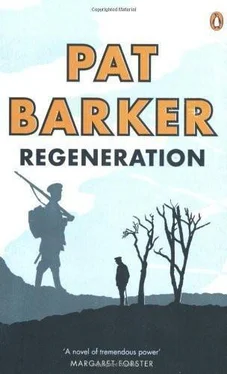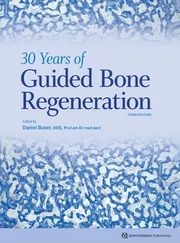‘Oh, quite right. He’s the interesting one. The others are just routine.’
They were walking down to the MOs’ dining room for lunch.
‘You do only one session?’ Rivers asked.
‘Yes. The patient has to know when he enters the electrical room that there’s no way out except by a full recovery.’ Yealland hesitated. ‘I normally do treatments alone.’
‘I’ll be as unobtrusive as I can.’
Yealland nodded. ‘Good. The last thing these patients need is a sympathetic audience.’
After lunch they went straight to the electrical room. Rivers sat on a hard chair in the corner, prepared to stay as long as necessary. The only other furniture was a small desk under the tall window, with a stack of buff-coloured files on it, the battery and the patient’s chair, rather like a dentist’s chair, except for the straps on the arms and around the foot rest. Yealland, who’d been emptying his bladder in preparation for a long session, came in, rubbing his hands. He nodded cheerfully to Rivers, but didn’t speak. Then, rather to Rivers’s surprise, he began pulling down the blinds. The blinds were the thick, efficient blinds of wartime, and after he’d finished not a chink of light from the dank, November day could get into the room. Rivers now expected him to turn on the overhead lights, but he didn’t. Instead, he left the room in darkness, except for a small circle of light round the battery. This light was reflected off his white coat and up on to his face.
Callan was brought in. He looked indifferent, or defiant, though once he was settled in the chair his eyes shifted from side to side in a way that suggested fear.
‘I am going to lock the door,’ Yealland said. He returned to stand before the patient, ostentatiously dropping the key into his top pocket. ‘You must talk before you leave me.’
All very well, Rivers thought. But Yealland had locked himself in as well as the patient. There could be no backing down.
Yealland put the pad electrode on the lumbar spines and began attaching the long pharyngeal electrode. ‘You will not leave me,’ he said, ‘until you are talking as well as you ever did. No, not a minute before.’
The straps on the chair were left unfastened. Yealland inserted a tongue depressor. Callan neither co-operated nor struggled, but simply sat with his mouth wide open and his head thrown back. Then the electrode was applied to the back of his throat. He was thrown back with such force that the leads were ripped out of the battery. Yealland removed the electrode. ‘Remember you must behave as becomes the hero I expect you to be,’ Yealland said. ‘A man who has been through so many battles should have a better control of himself.’ He fastened the straps round Callan’s wrists and feet. ‘Remember you must talk before you leave me .’
Callan was white and shaking, but it was impossible to tell how much pain he was in, since obviously he could no more scream than he could speak. Yealland applied the electrode again, continuously, but evidently with a weaker current since Callan was not thrown back. ‘Nod to me when you are ready to attempt to speak.’
It took an hour. Rivers during all that time scarcely moved. His empathy with the man in the chair kept him still, since Callan himself never moved, except once to flex the fingers of his strapped hands. At last he nodded. Immediately the electrode was removed, and after a great deal of effort Callan managed to say ‘ah’ in a sort of breathy whisper.
Yealland said, ‘Do you realize that there is already an improvement? Do you appreciate that a result has already been achieved? Small as it may seem to you, if you will consider rationally for yourself, you will believe me when I tell you that you will be talking before long.’
The electrode was applied again. Yealland started going through the sounds of the alphabet: ah, bah, cah, dah, etc., encouraging Callan to repeat the sounds after him, though only ‘ah’ was repeated. Whenever Callan said ‘ah’ on request, the electrode was momentarily removed. Whenever he substituted ‘ah’ for other sounds, the current was reapplied.
They had now been in the room an hour and a half. Callan was obviously exhausted. Despite the almost continuous application of the electric current he was actually beginning to drop off to sleep. Yealland evidently sensed he was losing his patient’s attention and unstrapped him. ‘Walk up and down,’ he said.
Callan did as he was bid, and Yealland walked beside him, encouraging him to repeat the sounds of the alphabet, though, again, only ‘ah’ was produced and that in a hoarse whisper, very far back in the throat. Callan stumbled as he walked, and Yealland supported him. Up and down they went, up and down, in and out of the circle of light around the battery.
Rebellion came at last. Callan wrenched his arm out of Yealland’s grasp and ran to the door. Evidently he’d forgotten it was locked, though he remembered at once and turned on Yealland.
Yealland said, ‘Such an idea as leaving me now is most ridiculous. You cannot leave the room. The door is locked and the key is in my pocket. You will leave me when you are cured, remember, not before. I have no doubt you are tired and discouraged, but that is not my fault; the reason is that you do not understand your condition as I do, and the time you have already spent with me is not long in comparison with the time I am prepared to stay with you. Do you understand me?’
Callan looked at Yealland. For a second the thought of striking him was clearly visible, but then Callan seemed to admit defeat. He pointed to the battery and then to his mouth, miming: Get on with it .
‘No,’ Yealland said. ‘The time for more electrical treatment has not yet come; if it had, I should give it to you. Suggestions are not wanted from you; they are not needed. When the time comes for more electricity, you will be given it whether you want it or not.’ He paused. Then added with great emphasis: ‘ You must speak, but I shall not listen to anything you have to say .’
They walked up and down again, Callan still repeating ‘ah’, but making no other sound. The ‘ah’ was produced by an almost superhuman effort, the muscles of the neck in spasm, the head raised in a series of jerks. Even the torso and the arms were involved in the immense effort of pushing this sound across his lips. Rivers had to stop himself trying to make the sound for him. He was himself very tense; all the worst memories of his stammer came crowding into his mind.
Yealland said, ‘You are now ready for the next stage of treatment, which consists of the administration of strong shocks to the outside of the neck. These will be transmitted to your voice box and you will soon be able to say anything you like in a whisper.’
Callan was again placed in the chair and again strapped in. The key electrode was applied in short bursts to his neck in the region of the larynx, Yealland repeating ‘ah, bah, cah, dah’, etc. in time with the shocks. On the third repetition of the alphabet, Callan suddenly said ‘ba’. Instead of attempting the next sound, he went on repeating ‘ba’, not loudly, but venomously. ‘Bah, bah’, and then, unmistakably ‘Baaaa! Baaaaa! Baaaaaa!’
Yealland actually looked gratified. He said, ‘Are you not glad you have made such progress?’
Callan started to cry. For a while there was no other sound in the room than his sobbing. Then he wiped his eyes on the back of his hand and mimed a request for water.
‘Yes, you will have water soon. Just as soon as you can utter a word.’
Callan pushed Yealland aside and ran to the door, rattling the handle, beating on the wood with his clenched fists. Rivers couldn’t bear to go on watching. He looked down at the backs of his clasped hands.
Читать дальше












